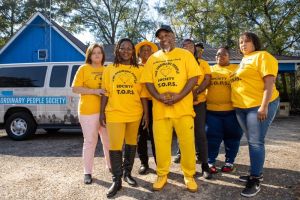Is Alabama Killing Prisoners To Steal Their Organs?

Source: The TOPS organization / TOPS
Rodreisha L. Russaw first heard about Jim Kennedy Jr.’s missing organs from a colleague of hers at the coalition, Alabamians for Fair Justice last year. Kennedy had been killed while incarcerated in an Alabama prison. Officials notified the family of his death some four days after his passing. That was bad. But not as bad as a call one of Kennedy’s family members received from the funeral home. They wanted to know if the family was aware that all of their loved one’s organs were missing.
“It’s hard to describe how horrifying that was to hear,” Ms. Russaw began. “I knew that there was research to be done.” Was it a one-time thing or was it common practice, she wanted to know. Russaw is the executive director of the criminal justice reform organization, The Ordinary People’s Society (TOPS).
Founded in 2001 by Rev. Al Sharpton’s brother, Rev. Kenneth Glasgow, who himself had done time after being convicted of a nonviolent drug law offense, the organization has not only done direct service work by feeding tens of thousands over the last nearly 23 years, but they’ve also been behind major policy advances, including ensuring that people detained pretrial could vote. Led by Glasgow, thousands of prisoners registered to vote.
(Rev. Glasgow is currently incarcerated in the federal system for a finance-related conviction, but the work he started, continues to thrive.)
Ms. Russaw did not have to wait very long to find out if Kennedy’s case was an isolated one. Five additional families came forward with the same terrible story the Kennedy family had shared. Russaw went on air immediately–TOPS has its own radio station, WKCG–and informed the community it serves of what was going on.
Last week, a suit was filed on their behalf in Montgomery County Circuit Court. The suit alleges that the University of Alabama and the Alabama Department of Corrections are, essentially, partners in organ trafficking.
Going back to roughly 2005, both institutions signed an agreement allowing prison wardens to be the only consent needed to provide consent for not only autopsies, but the organ removal and harvesting. Specifically, the just before the signature line, the agreement reads:
“l do, therefore, give my permission for the performance of an autopsy including the removal of organs or tissues from said inmate for diagnostic or other testing, including final disposition thereof.”
The families never knew of the hush-hush administrative agreement. There was no public bill or debate about the power being given to the wardens–which was not surprising. Alabama’s practice seemed to veer dangerously close to a practice in China that has roundly been condemned by the U.S. and Western nations. As far back as 2001, China had been deeply criticized by members of the global human rights community for its harvesting and selling of organs from executed prisoners. More often than not, the executed prisoners were from one of the nation’s most targeted and oppressed minorities, practitioners of the religion, Falun Gong.
In the U.S., questions about Black people being discriminated against by structural and systemic racism at all areas of the criminal justice system, has long been settled by people across political divides. While not all of the Alabama prisoners whose body parts were taken from them are Black, we know that Black people are wildly overrepresented in the state’s prisons. African Americans are a quarter of the state’s population but 53% of its prison population.
Additionally, we don’t know how many prisoners have had their organs taken from them post-mortem. “Besides being disgusting and cruel,” Russaw began to observe, “this is a state that holds fast to conservatism–especially in an area like this.” More, Alabama Corrections has long been retained the title as one of the deadliest prison systems in the nation. Last year, they hit a record high: 325 homicides behind the wall.
“Corrections drives those deaths. That’s not just my opinion. That’s the finding of Trump’s Department of Justice in 2020!” Russaw was correct. The federal government held Alabama responsible for not protecting prisoners from sexual and other forms of violence committed by both prisoners and guards. The decades-long problem of overcrowded prisons in Alabama only heightens the inherent stress and anger.
Now, with Alabama becoming the first state to execute people using Nitrogen, more suspicion is aroused. Nitrogen is better equipped to leave organs in tact than the poisons used in lethal injection are. They cause organ failure. Will executions ramp up and sidestep due process?
But nothing has changed much over all of these years, which should signal how incredible incapable and failed Alabama’s lawmakers are. The largest law enforcement entity in Alabama are correctional officers. That should signal that social structures, norms and policies have failed Alabamians. In a well-functioning society, very few people should be incarcerated.
“One thing that really stopped me was that brains were being harvested too,” Russaw concludes pensively. “What can you do with a harvested brain except experiment on it?”
And we certainly know Alabama’s history when it comes to that.
The post Is Alabama Killing Prisoners To Steal Their Organs? appeared first on NewsOne.




